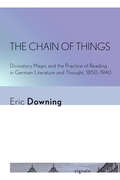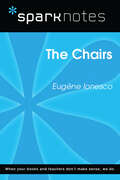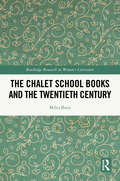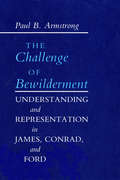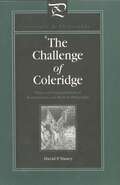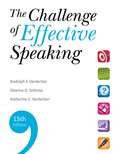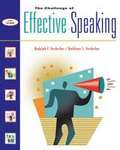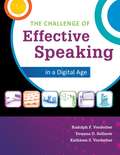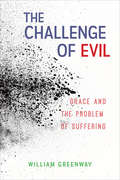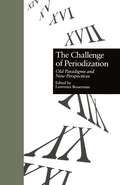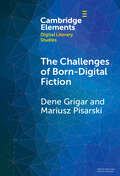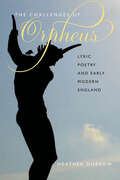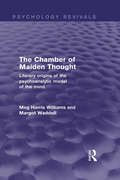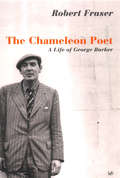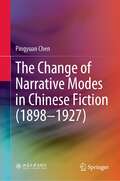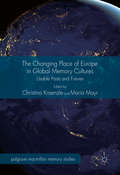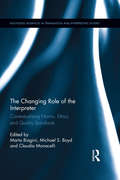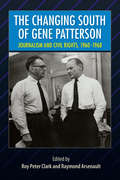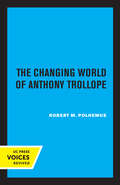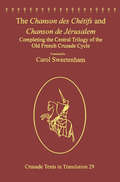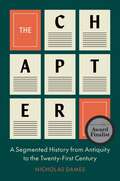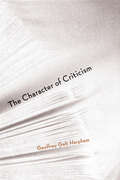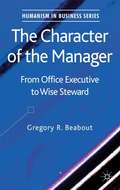- Table View
- List View
The Chain of Things: Divinatory Magic and the Practice of Reading in German Literature and Thought, 1850–1940 (Signale: Modern German Letters, Cultures, and Thought)
by Eric DowningIn The Chain of Things, Eric Downing shows how the connection between divinatory magic and reading shaped the experience of reading and aesthetics among nineteenth-century realists and modernist thinkers. He explores how writers, artists, and critics such as Gottfried Keller, Theodor Fontane, and Walter Benjamin drew on the ancient practice of divination, connecting the Greek idea of sympathetic magic to the German aesthetic concept of the attunement of mood and atmosphere.Downing deftly traces the genealogical connection between reading and art in classical antiquity, nineteenth-century realism, and modernism, attending to the ways in which the modern re-enchantment of the world—both in nature and human society—consciously engaged ancient practices that aimed at preternatural prediction. Of particular significance to the argument presented in The Chain of Things is how the future figured into the reading of texts during this period, a time when the future as a narrative determinant or article of historical faith was losing its force. Elaborating a new theory of magic as a critical tool, Downing secures crucial links between the governing notions of time, world, the "real," and art.
The Chairs (SparkNotes Literature Guide Series)
by SparkNotesThe Chairs (SparkNotes Literature Guide) by Eugene Ionesco Making the reading experience fun! Created by Harvard students for students everywhere, SparkNotes is a new breed of study guide: smarter, better, faster.Geared to what today's students need to know, SparkNotes provides:chapter-by-chapter analysis explanations of key themes, motifs, and symbols a review quiz and essay topicsLively and accessible, these guides are perfect for late-night studying and writing papers.
The Chalet School Books and the Twentieth Century (Routledge Research in Women's Literature)
by Miles BooyThe first full-length study of this beloved children’s series, The Chalet School in the Twentieth Century moves beyond the largely generic analysis within which it has previously been discussed. Published between 1925 and 1970, the series moves from European reconciliation after the Great War, through a second global conflict to a post-war world increasingly defined by increased secularity and emerging consumerism. Reproducing cover illustrations, Miles Booy’s book examines both those issues which author Elinor M. Brent-Dyer consciously explored (such as the exceptional The Chalet School in Exile, which she sought to explain the Nazi occupation of Austria to her young readers) and those aspects of the text which must be read symptomatically. This is a book which will engage students with historical and cultural interests beyond children’s literature. With barely a midnight feast in sight, but much anxiety about social change, it’s a familiar genre, but not as you think you know it. Hurry up, new girls, class is about to begin...
The Challenge of Bewilderment: Understanding and Representation in James, Conrad, and Ford
by Paul B. ArmstrongThe Challenge of Bewilderment treats the epistemology of representation in major works by Henry James, Joseph Conrad, and Ford Madox Ford, attempting to explain how the novel turned away from its traditional concern with realistic representation and toward self-consciousness about the relation between knowing and narration. Paul B. Armstrong here addresses the pivotal thematic experience of "bewilderment," an experience that challenges the reader’s very sense of reality and that shows it to have no more certainty or stability than an interpretative construct. Through readings of The Sacred Fount and The Ambassadors by James, Lord Jim and Nostromo by Conrad, and The Good Soldier and Parade’s End by Ford, Armstrong examines how each writer dramatizes his understanding of the act of knowing. Armstrong demonstrates how the novelists’ attitudes toward the process of knowing inform experiments with representation, through which they thematize the relation between the understanding of a fictional world and everyday habits of perception. Finally, he considers how these experiments with the strategies of narration produce a heightened awareness of the process of interpretation.
The Challenge of Coleridge: Ethics and Interpretation in Romanticism and Modern Philosophy (Literature and Philosophy)
by David HaneyInterweaving past and present texts, The Challenge of Coleridge engages the British Romantic poet, critic, and philosopher Samuel Taylor Coleridge in a "conversation" (in Hans-Georg Gadamer’s sense) with philosophical thinkers today who share his interest in the relationship of interpretation to ethics and whose ideas can be both illuminated and challenged by Coleridge’s insights into and struggles with this relationship.In his philosophy, poetry, theology, and personal life, Coleridge revealed his concern with this issue, as it manifests itself in the relation between technical and ethical discourse, between fact and value, between self and other, and in the ethical function of aesthetic experience and the role of love in interpretation and ethical action.Relying on Gadamer’s hermeneutics to supply a framework for his approach, Haney connects Coleridge’s ideas with, among others, Emmanuel Levinas’s other-oriented notion of ethical subjectivity, Paul Ricoeur’s view about the other’s implication in the self, reinterpretations of Greek drama by Bernard Williams and Martha Nussbaum, and Gianni Vattimo's post-Nietzschean hermeneutics.Coleridge is treated not as a product of Romantic ideology to be deconstructed from a modern perspective, but as a writer who offers a "challenge" to our modern tendency to compartmentalize interpretive issues as a concern for literary theorists and ethical issues as a concern for philosophers. Looking at the two together, Haney shows through his reading of Coleridge, can enrich our understanding of both.
The Challenge of Effective Speaking
by Rudolph F. Verderber Kathleen S. Verderber Deanna D. SellnowDo you want to ace your public speaking course? All you need to know, including all of the skills that will help you become a confident speaker and conquer speaking anxiety, are thoroughly covered in THE CHALLENGE OF EFFECTIVE SPEAKING, 15e. A favorite with students, this best seller guides you through six key "Speech Planning Action Steps". The result? You'll learn how to prepare and deliver strong speeches that get you good grades in your public speaking course! You'll be guided through topic selection, audience analysis and adaptation, effective research (including appropriate use of Internet resources), organization (with an emphasis on outlining), and language and delivery. The new 15th edition of this nationwide best seller also including many online tools, including videos of actual student speeches accompanied by Interactive Video Activities that help you develop and strengthen your public speaking skills. Authors Rudy and Kathie Verderber, together with new coauthor Deanna D. Sellnow, have grounded this new edition with the latest research to give you an exceptional resource for creating and delivering your speeches.
The Challenge of Effective Speaking (12th edition)
by Rudolph F. Verderber Kathleen S. VerderberThis textbook introduces the skills of public speaking and applies them to work-related meetings, personal business transactions, and personal relationships. The authors describe how to develop confidence, listen effectively, analyze the audience, research information, organize ideas, practice delivery, and speak persuasively. Annotation ©2004 Book News, Inc., Portland, OR (book news.com)
The Challenge of Effective Speaking in a Digital Age (Sixteenth Edition)
by Rudolph F. Verderber Kathleen S. Verderber Deanna D. SellnowAll the skills you need to know to become a confident speaker and conquer speaking anxiety are thoroughly covered in THE CHALLENGE OF EFFECTIVE SPEAKING IN A DIGITAL AGE, 16E. A pioneer in the field, this best seller guides you through six key Speech Planning Action Steps: topic selection, audience analysis and adaptation, effective research (including appropriate use of Internet resources), organization (with an emphasis on outlining), presentational aids (and how to avoid succumbing to "death by PowerPoint"), and language and delivery. The new edition also includes many online tools, such as videos of student speeches accompanied by Interactive Video Activities that help develop and strengthen public speaking skills. Grounded in the latest research, this new edition is an exceptional resource for creating and delivering speeches.
The Challenge of Evil: Grace And The Problem Of Suffering
by William GreenwayBelief in God in the face of suffering is one of the most intractable problems of Christian theology. Many respond to the spiritual challenge of evil by ignoring it, blaming God, or insisting on the inherent meaninglessness of life. In this book, William Greenway contends that we don't have to deny our moral selves by either ignoring evil or abandoning our moral sensibilities toward it. We can open our eyes fully to suffering and evil, and our own complicity in them. We can do so because it is only in this full acceptance of the world's guilt and our own that we make ourselves fully open to agape, to being seized by love of others and God. Inspired by the Jewish philosopher Emmanuel Levinas and the Christian novelist Fyodor Dostoyevsky, The Challenge of Evil lovingly explains how we can look squarely at the overwhelming suffering in the world and still, by grace, have faith in a good and loving God.
The Challenge of Periodization: Old Paradigms and New Perspectives
by Lawrence BessermanFirst published in 1996. Routledge is an imprint of Taylor & Francis, an informa company.
The Challenge of Rousseau
by Christopher Kelly Eve GraceWritten by prominent scholars of Jean-Jacques Rousseau's philosophy, this collection celebrates the 300th anniversary of Rousseau's birth and the 250th anniversary of the publication of Emile. The depth and systematic character of Rousseau's thought was recognized almost immediately by thinkers such as Kant and Hegel, yet debate continues over the degree to which Rousseau's legacy is the result of poetic, literary, or rhetorical genius, rather than of philosophic rigor or profundity. The authors focus on Rousseau's genuine yet undervalued stature as a philosopher. This collection includes essays that develop some of the complex problems Rousseau treated so radically and profoundly, as well as essays on the vigorous debates he engaged in with thoughtful contemporaries and predecessors.
The Challenges of Born-Digital Fiction: Editions, Translations, and Emulations (Elements in Digital Literary Studies)
by Dene Grigar Mariusz PisarskiThe Challenges of Born-Digital Fiction: Editions, Translations, and Emulations addresses the growing concern about how best to maintain and extend the accessibility of early interactive novels and hypertext fiction or narratives. These forms of born-digital literature were produced before or shortly after the mainstreaming of the World Wide Web with proprietary software and on formats now obsolete. Preserving and extending them for a broad study by scholars of book culture, literary studies, and digital culture necessitate they are migrated, translated, and emulated – yet these activities can impact the integrity of the reader experience. Thus, this Element centers on three key challenges facing such efforts: (1) precision of references: identifying correct editions and versions of migrated works in scholarship; (2) enhanced media translation: approaching translation informed by the changing media context in a collaborative environment; and (3) media integrity: relying on emulation as the prime mode for long-term preservation of born-digital novels.
The Challenges of Orpheus: Lyric Poetry and Early Modern England
by Heather Dubrow2008 Outstanding Academic Title, Choice MagazineAs a literary mode "lyric" is difficult to define precisely. While the term has conventionally been applied to brief, songlike poems expressing the speaker's interior thoughts critics have questioned many of the assumptions underlying this definition, calling into doubt the very possibility of self-expression in language.Whereas much recent scholarship on lyric has centered on the Romantic era, Heather Dubrow turns instead to the poetry of early modern England. The Challenges of Orpheus confronts widespread assumptions about lyric, exploring such topics as its relationship to its audiences, the impact of material conditions of production and other cultural pressures, lyric's negotiations of gender, and the interactions and tensions between lyric and narrative. Offering fresh perspectives on major texts of the period—from Wyatt's "My lute awake" to Milton's Nativity Ode—as well as poems by lesser-known figures, Dubrow extends her critical conclusions to poetry in other historical periods and to the relationship between creative writers and critics, recommending new directions for the study of lyric and of genre.
The Challenges of Orpheus: Lyric Poetry and Early Modern England
by Heather DubrowThis critical exploration of how we define lyric poetry is “thorough, penetrating, and on the cutting edge of contemporary scholarship” (Choice).As a literary mode “lyric” is difficult to define. The term is conventionally applied to brief, songlike poems expressing the speaker’s interior thoughts, but many critics have questioned the underlying assumptions of this definition. While many people associate lyric with the Romantic era, Heather Dubrow turns instead to the poetry of early modern England. The Challenges of Orpheus confronts widespread assumptions about lyric, exploring such topics as its relationship to its audiences, the impact of material conditions of production and other cultural pressures, lyric’s negotiations of gender, and the interactions and tensions between lyric and narrative.Dubrow offers fresh perspectives on major texts of the period—from Sir Thomas Wyatt’s “My lute awake” to John Milton’s Nativity Ode—as well as poems by lesser-known figures. She also extends her critical conclusions to poetry in other historical periods and to the relationship between creative writers and critics, recommending new directions for the study of lyric and of genre.A Choice Magazine Outstanding Academic Title
The Chamber of Maiden Thought: Literary Origins of the Psychoanalytic Model of the Mind (Psychology Revivals)
by Margot Waddell Meg Harris WilliamsLiterature is recognised as having significantly influenced the development of modern psychoanalytic thought. In recent years psychoanalysis has drawn increasingly on the literary and artistic traditions of western culture and moved away from its original medical–scientific context. Originally published in 1991 The Chamber of Maiden Thought (Keats's metaphor for 'the awakening of the thinking principle') is an original and revealing exploration of the seminal role of literature in forming the modern psychoanalytic model of the mind.The crux of the 'post-Kleinian' psychoanalytic view of personality development lies in the internal relations between the self and the mind's 'objects'. Meg Harris Williams and Margot Waddell show that these relations have their origins in the drama of identifications which we can see played out metaphorically and figuratively in literature, which presents the self-creative process in aesthetic terms. They argue that psychoanalysis is a true child of literature rather than merely the interpreter or explainer of literature, illustrating this with some examples from clinical experience, but drawing above all on close scrutiny of the dynamic mental processes presented in the work of Shakespeare, Milton, the Romantic poets, Emily Bronte and George Eliot.The Chamber of Maiden Thought will encourage psychoanalytic workers to respond to the influence of literature in exploring symbolic mental processes. By bringing psychoanalysis into creative conjunction with the arts, it enables practitioners to tap a cultural potential whose insights into the human mind are of immense value.
The Chameleon Poet: A Life of George Barker
by Robert FraserThe poet George Barker was convinced that his biography could never be written. 'I've stirred the facts around too much,' he told Robert Fraser. 'It simply can't be done.' Eliot wrote of his 'genius'. Yeats thought him the most interesting poet of his generation. Dylan Thomas envied his power over women. War trapped him in Japan. In America he conducted one of the most celebrated love affairs of the century. He fathered fifteen children in several countries, three during one battle-torn summer. By the 1950s he was the toast of Soho. Barker was Catholic and bohemian, frank and elusive, tender and boisterous. In Eliot's phrase, he was 'a most peculiar fellow.' Robert Fraser's biography offers both a portrait of a talented, tormented and irresistibly entertaining man, and a broad cultural landscape. Around the central figure cluster painters like Francis Bacon, Lucian Freud, Johnny Minton and the 'Roberts' Colquhoun and MacBryde; writers such as Dylan Thomas, Walter de la Mare and Elizabeth Smart, whose By Grand Central Station I Sat Down and Wept hymns their liaison; the lugubrious humorist Jeffrey Bernard. After closing time at the Colony Room, Minton declared, they had to sweep up the jokes.
The Change of Narrative Modes in Chinese Fiction (1898–1927)
by Pingyuan ChenThis book examines the Chinese fictions (xiaoshuo) published between 1898 and 1927 – three pivotal decades, during which China underwent significant social changes. It applies Narratology and Sociology of the Novel methods to analyze both the texts themselves and the social-cultural factors that triggered the transformation of the narrative mode in Chinese fiction. Based on empirical data, the author argues that this transformation was not only inspired by translated Western fiction, but was also the result of a creative transformation in tradition Chinese literature.
The Changing Place of Europe in Global Memory Cultures: Usable Pasts and Futures (Palgrave Macmillan Memory Studies)
by Christina Kraenzle and Maria MayrThis book investigates the transnational dimensions of European cultural memory and how it contributes to the construction of new non-, supra, and post-national, but also national, memory narratives. The volume considers how these narratives circulate not only within Europe, but also through global interactions with other locations. The Changing Place of Europe in Global Memory Cultures responds to recent academic calls to break with methodological nationalism in memory studies. Taking European memory as a case study, the book offers new empirical and theoretical insights into the transnational dimensions of cultural memory, without losing sight of the continued relevance of the nation. The articles critically examine the ways in which various individuals, organizations, institutions, and works of art are mobilizing future-oriented memories of Europe to construct new memory narratives. Taking into account the heterogeneity and transnational locations of commemorative groups, the multidirectionality of acts of remembrance, and a variety of commemorative media such as museums, film, photography, and literature, the volume not only investigates how memory discourses circulate within Europe, but also how they are being transferred, translated, or transformed through global interactions beyond the European continent.
The Changing Role of the Interpreter: Contextualising Norms, Ethics and Quality Standards (Routledge Advances in Translation and Interpreting Studies)
by Marta Biagini Michael S. Boyd Claudia MonacelliThis volume provides a critical examination of quality in the interpreting profession by deconstructing the complex relationship between professional norms and ethical considerations in a variety of sociocultural contexts. Over the past two decades the profession has compelled scholars and practitioners to take into account numerous factors concerning the provision and fulfilment of interpreting. Building on ideas that began to take shape during an international conference on interpreter-mediated interactions, commemorating Miriam Shlesinger, held in Rome in 2013, the book explores some of these issues by looking at the notion of quality through interpreters’ self-awareness of norms at work across a variety of professional settings, contextualising norms and quality in relation to ethical behaviour in everyday practice. Contributions from top researchers in the field create a comprehensive picture of the dynamic role of the interpreter as it has evolved, with key topics revisited by the addition of new contributions from established scholars in the field, fostering discussion and further reflection on important issues in the field of interpreting. This volume will be key reading for scholars, researchers, and graduate students in interpreting and translation studies, pragmatics, discourse analysis, and multilingualism.
The Changing South of Gene Patterson: Journalism and Civil Rights, 1960-1968 (Southern Dissent)
by Raymond Arsenault Roy Peter Clark"In pointing us toward how to be 'better than we are,' Gene Patterson--passionate, funny, sound of mind and full of heart--coincidentally reminds us just how fine journalism can be. This is a wonderful, inspiring book."--Geneva Overholser, syndicated columnist, Washington Post Writers Group, and Curtis B. Hurley Chair in Public Affairs Reporting, University of Missouri"Proves that journalism at its best can endure as literature. A compelling portrait of the 1960s and the American South by an engaged participant and acute observer."--Robert Schmuhl, University of Notre DameThe Changing South of Gene Patterson celebrates the work of one of America's most influential journalists who wrote in a time and place of dramatic social and political upheaval. The editor of the Atlanta Constitution from 1960 through 1968, Patterson wrote directly to his fellow white southerners every day, working to persuade them to change their ways. His words were so inspirational that he was asked by Walter Cronkite to read his most famous column, about the Birmingham church bombing, live on the CBS Evening News.This volume includes over 120 of Patterson's best pieces, selected from some 3,200 columns. These columns offer probing commentary on the crucial issues of race, civil rights, social justice, and desegregation; some reveal examples of political and moral leadership, drawn from every corner of southern culture. Introductory essays, framing Patterson's work as journalism and literature, place it in the context of southern history and the evolution of white southern liberalism. Patterson himself contributes a new essay, reflecting on his life, work, and times. At a time when protest, violence, and confrontation defined race relations and even the South itself, Patterson's wise, sane, humorous, passionate column appeared daily on the Constitution's editorial page, urging white southerners to become "better than we are." Speaking as one who "grew up hard" in small-town Georgia, Patterson could urge change with a conviction and credibility matched by few others. With enlightened leadership and adherence to the rule of law, the sky would not fall, Patterson assured his readers. While black leaders led America toward civil rights and social justice, writers such as Patterson had the courage to appeal to the white southern conscience. Unmistakably engaged with his time and place, Patterson's columns provide a compelling day-to-day look at the civil rights era as it unfolded. Roy Peter Clark is a senior scholar at The Poynter Institute, a school for journalists in St. Petersburg, Florida. Raymond Arsenault, winner of the Florida Humanities Council 2019 Florida Lifetime Achievement Award for Writing, is the John Hope Franklin Professor of History at the University of South Florida, St. Petersburg.
The Changing World of Anthony Trollope
by Robert M. PolhemusThis title is part of UC Press's Voices Revived program, which commemorates University of California Press’s mission to seek out and cultivate the brightest minds and give them voice, reach, and impact. Drawing on a backlist dating to 1893, Voices Revived makes high-quality, peer-reviewed scholarship accessible once again using print-on-demand technology. This title was originally published in 1968.
The Chanson des Chétifs and Chanson de Jérusalem: Completing the Central Trilogy of the Old French Crusade Cycle (Crusade Texts in Translation)
by Carol SweetenhamThe First Crusade was arguably one of the most significant events of the Middle Ages. It was the only event to generate its own epic cycle, the Old French Crusade Cycle. The central trilogy at the heart of the Cycle describes the Crusade from its beginnings to the climactic battle of Ascalon, comprising the Chanson d’Antioche, the Chanson des Chétifs and the Chanson de Jérusalem. This translation of the Chétifs and the Jérusalem accompanies and completes the translation of the Antioche and makes the trilogy available to English readers in its entirety for the first time. The value of the trilogy lies above all in the insight it gives us to medieval perceptions of the Crusade. The events are portrayed as part of a divine plan where even outcasts and captives can achieve salvation through Crusade. This in turn underlies the value of the Cycle as a recruiting and propaganda tool. The trilogy gives a window onto the chivalric preoccupations of thirteenth-century France, exploring concerns about status, heroism and defeat. It portrays the material realities of the era in vivid detail: the minutiae of combat, smoke-filled halls, feasts, prisons and more. And the two newly translated poems are highly entertaining as well, featuring a lubricious Saracen lady not in the first flush of youth, a dragon inhabited by a devil, marauding monkeys, miracles and much more. The historian will find little new about the Crusade itself, but abundant material on how it was perceived, portrayed and performed. The translation is accompanied by an introduction examining the origins of the two poems and their wider place in the cycle. It is supported by extensive footnotes, a comprehensive index of names and places and translations of the main variants.
The Chapter: A Segmented History from Antiquity to the Twenty-First Century
by Nicholas DamesFinalist for the National Book Critics Circle Award in CriticismShortlisted for the Christian Gauss Award, Phi Beta Kappa SocietyA history of the chapter from its origins in antiquity to todayWhy do books have chapters? With this seemingly simple question, Nicholas Dames embarks on a literary journey spanning two millennia, revealing how an ancient editorial technique became a universally recognized component of narrative art and a means to register the sensation of time.Dames begins with the textual compilations of the Roman world, where chapters evolved as a tool to organize information. He goes on to discuss the earliest divisional systems of the Gospels and the segmentation of medieval romances, describing how the chapter took on new purpose when applied to narrative texts and how narrative segmentation gave rise to a host of aesthetic techniques. Dames shares engaging and in-depth readings of influential figures, from Sterne, Goethe, Tolstoy, and Dickens to George Eliot, Machado de Assis, B. S. Johnson, Agnès Varda, Uwe Johnson, Jennifer Egan, and László Krasznahorkai. He illuminates the sometimes tacit, sometimes dramatic ways in which the chapter became a kind of reckoning with time and a quiet but persistent feature of modernity.Ranging from ancient tablets and scrolls to contemporary fiction and film, The Chapter provides a compelling, elegantly written history of a familiar compositional mode that readers often take for granted and offers a new theory of how this versatile means of dividing narrative sculpts our experience of time.
The Character of Criticism
by Geoffrey Galt HarphamFirst published in 2007. Routledge is an imprint of Taylor & Francis, an informa company.
The Character of the Manager
by Gregory R. BeaboutExplores Alasdair MacIntyre's criticisms of the manager and retrieves an interdisciplinary approach to character transforming arguments. The manager as wise steward is proposed as a model for virtuous management.
